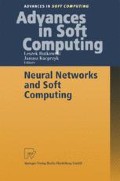Abstract
The tradeoff between accuracy and interpretability in fuzzy modeling has shifted into focus in last few years. This paper aims at improving accuracy of linguistic models while maintaining a good interpretability. A new gradient-based method, extended version of Jager approach, is proposed for the optimization of transparent Mamdani systems. The advantage of Mamdani systems if compared to 0th order TS systems in Jager approach is that their interpolation properties allow one to obtain less complex models without loss of accuracy. Several modeling examples confirming the advantages of the chosen algorithm are included.
Access this chapter
Tax calculation will be finalised at checkout
Purchases are for personal use only
Preview
Unable to display preview. Download preview PDF.
References
Nomura, H., Hayashi, I., Wakami, M. (1992) A learning method of fuzzy inference by descent method. Proc. 1st IEEE Int. Conf. on Fuzzy Systems, pp. 485–491, San Diego, CA, USA.
Guely F., Siarry, P. (1993) Gradient descent method for optimizing various fuzzy rule bases. Proc. 2nd IEEE Int. Conf. Fuzzy Syst., pp. 1241–46, San Francisco, CA, USA.
Jang, J.-S.R. (1993) ANFIS: Adaptive-network-based fuzzy inference system. IEEE Trans. Systems, Man and Cybernetics, 23 (3), 665–685.
Valente de Oliveira, J. (1999) Semantic constraints for membership function optimization. IEEE Trans. Systems, Man and Cybernetics Part A, 29(1), 128–138
Jager, R. (1995) Fuzzy Logic in Control. Ph.D. dissertation. Technical University of Delft, Delft, Holland.
Abonyi, J., Nagy, L., Szeifert, F. (1998) Indirect Model Based Control Using Fuzzy Model Inversion. Proc. IEEE Int. Conf. Intelligent Syst., pp. 951–956, Vienna, Austria.
Abonyi, J., Andersen, H. et al. (1999) Inverse fuzzy-process-model based direct adaptive control. Mathematics and Computers in Simulation, 51 (1–2), 119–132.
Riid, A., Rüstern, E. (2000) Transparent fuzzy systems and modeling with transparency protection. Proc. IFAC Symp. on Artificial Intelligence in Real Time Control, pp. 229–234. Budapest, Hungary.
Riid, A. (2002) Transparent Fuzzy Systems: Modeling and Control. Ph. D. dissertation. Tallinn Technical University, Tallinn, Estonia.
Jang, J.-S. R., Sun, C.-T., Mizutani, E. (1997) Neuro-Fuzzy and Soft Computing. Prentice Hall.
Author information
Authors and Affiliations
Editor information
Editors and Affiliations
Rights and permissions
Copyright information
© 2003 Springer-Verlag Berlin Heidelberg
About this paper
Cite this paper
Riid, A., Rüstern, E. (2003). Gradient Descent Based Optimization of Transparent Mamdani Systems. In: Rutkowski, L., Kacprzyk, J. (eds) Neural Networks and Soft Computing. Advances in Soft Computing, vol 19. Physica, Heidelberg. https://doi.org/10.1007/978-3-7908-1902-1_83
Download citation
DOI: https://doi.org/10.1007/978-3-7908-1902-1_83
Publisher Name: Physica, Heidelberg
Print ISBN: 978-3-7908-0005-0
Online ISBN: 978-3-7908-1902-1
eBook Packages: Springer Book Archive

